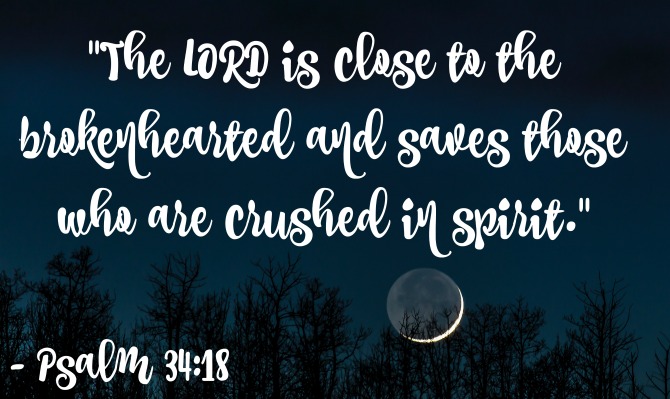“I know that God wants me to live a joyful life, so why is it so hard to access that joy?”
The question was raised during a community group meeting several weeks ago, and before I knew what I was saying, my response had slipped from my mouth: “I think it might be because we don’t know how to grieve.”

I’m not sure where that answer came from, but as soon as I’d spoken the words, I knew they were true. As a society, we (meaning American Christians) are terrible at grieving. It’s as though we believe that acknowledging pain and sorrow could somehow diminish the sovereignty of God. We don’t know how to reconcile His goodness with our sadness, so we don’t even try. When we encounter hardship, loss, and disappointment—which is inevitable—we swallow our emotions and plaster on a happy face. Joy becomes a mask, and before we know it, we’ve grown so accustomed to wearing and seeing this counterfeit version of joy, that authentic joy eludes us. This isn’t healthy, and it certainly isn’t Biblical.
The Bible has plenty to say about joy, but it also speaks to the topic of grief. We know that the biggest problem presented in the Bible is sin, which disrupted God’s plan for humanity. As a result, all of creation groans and longs for restoration (Romans 8). Responding to this concept, Curtis Zackary writes that, “in understanding this truth on such a large scale, it helps us realize that it is perfectly sensible and okay to acknowledge that we have things happen in our life that do not reflect the way that things are supposed to be.”
God will one day reconcile Creation to Himself, but that hasn’t happened yet. For now, there is hardship and loss. And grief is our normal and natural reaction to the losses we face in this world, whether that’s the loss of a loved one, the loss of a dream, or the loss of one’s own sense of wholeness. By acknowledging the pain and giving into the grief, we validate our own wounding—not unlike Jesus’ scars, which need not have marred his resurrected body, but served as evidence of his suffering. Our grief sheds light on the enormity of our suffering. And once our deepest hurts have been diagnosed, the healing can begin.
Several Biblical heroes (David, Job, and Joseph all come to mind) engaged in extended periods of mourning in which they cried out to God. And let’s not forget Jesus! For the last few months, my personal Bible reading has involved a deep-dive into the life of Christ. In my reading, I’ve been struck by Jesus’ amazing model of emotional wellness. Jesus was fully God, but he was also fully human, capable of experiencing an array of emotions. He didn’t deny any of them: he felt compassion; he was angry and demonstrated righteous indignation; he rejoiced and laughed; he was filled with agony and anguish; and he grieved. Jesus wept at the death of his friend Lazarus. He knew that he would be able to bring Lazarus back to life, but He didn’t skip the sadness to get to the happy ending. First, he fully acknowledged the pain, to the point of tears. Only then did he set about the work of restoration.

Grief and mourning are not meant to feel good; comfort is antithetical to the grieving process. Unfortunately, grief becomes even more unbearable because it’s unfamiliar and poorly understood. Not only do we dislike the act of grieving, but we are made to feel wrong or conspicuous for engaging in it. This is especially true when we grieve for longer than is deemed acceptable: it’s implied that it’s okay to be sad, just not too sad, and not for too long. But grief refuses to abide by our terms for appropriateness. It waxes and wanes along its own timeline, and though the hardest feelings usually begin to dissipate, the posture of grief can remain. When we grieve, we are being forced to reckon with something that can never be undone; it stands to reason that (in this life, at least) our grief may never fully come to an end.
The best possible outcome, then, isn’t a full extinguishment of our sadness, but an ability to welcome grief into the rhythms of our lives. As we enter into this place, we are able to access the good gifts of grief: grief helps us to tend to things with more care; it enables us to fully empathize with others; it allows us to understand that we are finite and limited, as are our loved ones; it forces us to recognize the limits of our agency; and it points us to the One True Healer, who has promised to make all things new. He becomes our solitary source of joy, and because of Him, we can experience that joy even as we grieve.
I don’t know why the topic of grief has been on my mind recently, or why I felt compelled to write this post. But grief (of the theoretical variety) has been all around me lately. It’s been popping up in the books I read, the podcasts I listen to, the conversations I’m having (and even some I’m simply overhearing). When that happens, I know that God is doing all He can to capture my attention. I hope (oh, how I hope) that the Lord isn’t preparing me for a season of grief that may be ahead. If that is the case, my prayer is that He will continue to fill me with joy and peace as I trust Him. His joy is abundant and available—on the other side of grief, and also in the midst of it.
